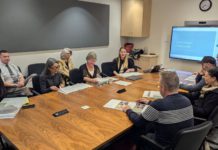The Sebastopol City Council has been talking about hiring an economic development director/community vitality specialist for more than a year and slated $40,000 for the half-time position. At the last city council meeting on May 5, it was announced that rather than hiring an individual, city staff opted to engage a company called CoMission, headed by former Sebastopol Mayor Craig Litwin.
Litwin is also a principal of the 421 Group, a cannabis consultancy, and though CoMission shares the same staff, Litwin said it’s a separate project devoted to community development.
Sonoma West spoke with Litwin about the city’s community vitality position, what his company will be doing for Sebastopol and how the position has changed in light of the pandemic.
Tell us about CoMission.
We launched the CoMission Group in preparation for community vitality work we’ve been looking to do here over the last two years. We’ve been planning to reach out and expand our repertoire to help strengthen local business and local nonprofits to create stronger community resiliency.
We applied for the position before the sheltering in place occurred. And when the sheltering happened, we continued to engage with the city as they altered the scope of the position to address the urgent emergency efforts that were required in response to the pandemic. Plus they added on a nonprofit component, which we’re very excited about.
What is the city is looking for in a community vitality position?
There are three major components: business, nonprofits and food resiliency. The first one is business outreach and helping to identify what businesses need and which businesses need support. So we’re beginning by taking an inventory of each of those businesses and identifying which ones need support, for example, with loan paperwork or other government program paperwork so we can assist them in doing that.
That’s part of the immediate pandemic response.
That’s correct. So originally the scope was envisioned to serve the business community to find out what’s working, what’s not, where they need support. And we still intend to continue with that original scope of work, except we’re adding in the responsive helping with the loan program and other government assistance programs and cross promotion in terms of making sure to get the word out about who is open.
Then there’s the nonprofit part. Councilmember (Sarah) Gurney wanted to see the council work on doing nonprofit outreach, identifying ways that they (nonprofits) could collaborate in order to save money. So for example, it could be shared staffing, resources or facilities; it could be philanthropic connections and cross promotions. So we’re taking on serving the nonprofits as well. And we’ll be starting discussions with the leaders of the local nonprofits to find ways that we can support them.
The third component is a food component … We’re looking at how to strengthen local food resiliency. For example, there’s the existing program that the city is looking into where restaurants get paid to help supply food to seniors and those with limited financial means. That’s real money that can pay restaurants to help real people who are hungry.
That’s an existing government program.
Yes, but it’s rather complex in its administrative oversight so we’re exploring if there’s a partner nonprofit that can administer the program, and then we can help assist the city in identifying restaurants, for example, that want to participate in that program.
So those are the three things, but our first scope directive is to complete the survey, and then identify immediate actions we can take to support the community in this difficult time.
We’re hammering out the business survey this week, and then we plan to launch that out electronically to all the businesses; we’ll reach out with follow-up phone calls and talk to people directly. Essentially we’re collecting data on who needs help and what kind of help and then identifying how we can provide the most amount of help for the least amount of money.
So tell us why you think the council chose CoMission for this particular job?
I think the number one reason that we were chosen is that we can hit the ground running. We have enough people on the team that we can do a quick canvass of the business and nonprofit communities and identify immediate responses to support those communities. We also have regional and statewide political connections so when we’re working to unlock different grant monies and make programs run smoother and more easily, my team knows who to call to get the job done.
Tell us about your team.
We’re uniquely poised, if you look at our team … Herman G. Hernandez, for example, is a member of our team. He’s a Sonoma County Office of Education board member. He ran Supervisor Hopkins’s and State Senator Mike McGuire’s political campaigns. He serves on the boards of multiple nonprofits, and he works to help support multiple foundations. He’s part of the Active 20-30 Club. He’s really plugged into the nonprofit component … so having Herman on the team, he’s going to really help bring more resources to bear.
Johnny Nolen is the other principal, also from the 421 Group. In his career path, he’s had a staff of 250 people. He’s excellent with numbers and budgets and understands all the nuances of the loan paperwork and moving that process forward. He has a team of administrators to help local businesses with that effort, so we can keep the cost down for this contract and really just maximize every hour that we have to support local businesses.
We have Ashley Nelson, who has a Green MBA and is definitely in line with the Sebastopol spirit and also understands what it takes to have solid local economics.
And you, of course. Remind us of how long you were on the city council?
I was on from 2000 to 2008. I got to serve as mayor twice. I ran again as a write-in candidate four years ago, but I want to make it clear that I’m not running for office. I have zero interest in that. But, you know, I’m a lifelong Sebastopol resident. My kids go to school here — I’ve got two kids at Brookhaven and one child at Analy who’s graduating as a senior. So this is it —this is my home, and giving everything we can to make sure our small town pulls through this crisis is what our team will bring to the table.
The city had discussed separating this job into two parts: the initial surveying and then taking what’s been learned and putting that into action. You must have some blue sky thoughts about what needs to be done in Sebastopol in terms of community vitality.
I have a number of blue sky thoughts, but right now I’m more interested in what the group think is, in what everybody brings forward because it’s us working collaboratively that will ultimately bring us the solutions that we need for our small community.
We’ll be looking at how our local business leaders are already beginning to respond and grapple with the current situation and to hear and learn what sorts of problems they’ve identified — short-term, mid-term and long-term — that’s a critical part of finding out what that blue sky scenario is for everybody.
There is a lot that our town already works on for promoting resiliency. We’ve moved in that direction for decades. We’re ahead of the curve in term of implementing mandatory solar green building, creating local businesses that support local food and sustainability, supporting critical nonprofits that provide community services. We’re already a very idyllic place. We face some unique challenges though in that we’re per capita an older community and like many communities, we face housing difficulties. Pre-pandemic, we were looking to examine some pretty big questions, like what does tourism look like in Sebastopol? Of course, that one in particular is very difficult to define right now.
Those are all things we’ll look at, but right now everybody’s just so focused on what we can do immediately to deal with the current crisis: how do we get these businesses back up post pandemic, what’s the immediate action that we need to take. That will be our initial focus.
78.9
F
Healdsburg
May 15, 2025









